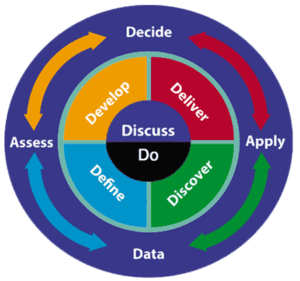Conversology In Schools
By Dr Charles Margerison
Psychologist
Introduction
To what extent can conversation be taught in schools? If students learn the art of conversation, will it improve their understanding of science, history, literature, mathematics and other areas? Will such conversational skills help students assist each other, as part of mutual learning? Beyond school, will conversational skills help students develop better relationships with their parents, siblings, and the people they meet in their community?
There is increasing interest in these questions, as more attention is focused upon student mental health and wellbeing. This is part of the wider attention that is being paid to Character Development that complements Curriculum Development in schools. It is increasingly recognized that passing examinations is only one indicator of a rounded education and that soft skills also play an important role in student development. Of these, the ability to converse is a key universal skill that is essential both in school and throughout life’s journey. This paper outlines ways and means by which teachers can help develop student’s conversational skills in all academic subjects as well as in social situations.
In my book ‘If Only I Had Said’ – which outlines conversation control skills, people can learn how to respond effectively using time dynamics, problem and solution-centered behaviour, requests and statements, and other methods such as parallel and sequential conversation. This publication can help students better understand the importance of Conversology. Indeed, I interviewed my own Grandson, Ben Batho, about the book and what he gained from it – you can hear his review here:
What Is Conversology?
Conversology – Dictionary Definition:
The study of the ways people discuss issues when exchanging information, and influencing others.
Conversology is the word that I have developed to identify the study of discussions in order to improve communication and understanding. Literacy and Numeracy have long been integral to the school curriculum. Given that so much learning is dependent upon verbal interaction, the subject of Conversology should also be added as a formal subject in schools, colleges and universities. There are strong reasons for having a special focus on Conversology, as a subject in its own right.

The foundations for such a subject are well established in history. The Greeks valued and taught the subject of Rhetoric, as the basis for free speech. They recognized Rhetoric as the ability to persuade through discourse. Aristotle provided guidelines when he referred to Logos, Pathos and Ethos, as three major modes of persuasion. The ability to influence through conversation has always been the foundation of democratic debate, and also the basis for business and social interaction.

More recently, we have witnessed the emergence of terms like ‘critical thinking’ and ‘proactive thinking’ that are used in schools. Also, a field of study in psychology, called ‘discursive analysis,’ has emerged as a professional area of enquiry. This assesses the way people discuss issues and resolve differences. In addition, issues of meaning are covered by those who focus on Semiotics. Those who study Communication Analysis and Oracy have made contributions to the study of social interaction. Also, Sociolinguistics is a subject that compares and contrasts the language within different societies and cultures and is integral to the subject of Anthropology.
Conversology links with and builds upon these contributions, with a special focus on the applications to both personal and interactive learning. Therefore, in this article, I will outline specific ways in which Conversology can be applied in schools and business.
Key Conversation Skills

All subjects that can be studied have a structure. This applies to Conversology. One of the key frameworks that I have developed is as shown here, and is often referred to as the Margerison Discuss/Decide Model.
Applications
Feedback – We recognize that we can improve our performance when we gain feedback. However, the way the feedback is given often determines the extent to which the feedback is accepted. Sometimes feedback can be gained impersonally, such as via a video of a performance, but more often it is given during conversations. Students can learn how to give and receive both negative and positive feedback. They can also learn how to phrase questions, in order to receive useful feedback.
Negotiation – Throughout life, we all have to negotiate. Sometimes it may be informal, such as discussing where to go for a meal with friends or it may be more business based, when agreeing a contract and price for a project. Negotiation clearly involves discussion skills. As observed by Dr Chester Karrass, one leader in the field of negotiation, “you don’t get what you deserve, you get what you negotiate.”

Appreciation – We all depend on other people to provide support, help and services. The extent to which people help us depends, in part, on the way we converse and, in particular, on the way we show appreciation. This is not only a courtesy, but also a skill that can be taught.
Interviews – To gain a job ,one usually has to attend an interview. An ability to respond to questions and present ideas and information is assessed by the selectors. One can improve performance at interviews through training in conversation.
Teamwork – The ability to converse will influence the contributions one can make to teamwork. As projects become more complex, the more it is necessary to share and compare ideas and information with others. The quality of the decisions made and commitment to action reflects the conversation skills of those involved.
Problem-Solving – Each day, we have to solve problems, albeit modern technology can help provide information via smart phones and computers. It is the ability to use conversation skills that goes beyond the technology and information.
Educational Applications
Within schools, conversation is a key to academic understanding. Therefore, the understanding of specific language terms for curriculum topics is important.
 Science – Students will be taught the language of Science, inclusive of hypothesis development and testing, as part of research methods. Scientific understanding and achievement depends, to a large extent, on the sharing of views and perceptions via conversation. Thomas Kuhn indicated that breakthroughs in science emerge when new paradigms are perceived and tested. That is often the result of conversation. Skill in using scientific concepts, phrases and ideas can be improved via using the principles of Conversology.
Science – Students will be taught the language of Science, inclusive of hypothesis development and testing, as part of research methods. Scientific understanding and achievement depends, to a large extent, on the sharing of views and perceptions via conversation. Thomas Kuhn indicated that breakthroughs in science emerge when new paradigms are perceived and tested. That is often the result of conversation. Skill in using scientific concepts, phrases and ideas can be improved via using the principles of Conversology.
Mathematics – Students will be taught the language of geometry, algebra, trigonometry and other key aspects of numeracy. To what extent can the learning process be improved through conversation on such issues?
Literature – By its very nature, the study of literature extends a student’s vocabulary, but does it improve their ability to converse? Conversology will assist them to do this, by providing a process where students can learn how to communicate effectively by discussing literary ideas.
Personal Health and Wellbeing – Given there is considerable stress associated with examinations, plus other individual anxieties that arise from time to time, it is important that students learn how to discuss and resolve such concerns. Understanding the principles of Conversology will assist students to maintain and improve their wellbeing.
Social and Cultural Studies – In most schools, there are many students from different cultural backgrounds. Therefore, conversations to understand and respect cultural diversity are important. The principles and guidelines derived from Conversology research can help students improve their communications and interaction with people from different countries and cultures.
Drama and Music – These areas of creative expression are ones where effective conversation skills will enhance the learning that students gain. As part of my work, I have focused on this area and developed short musical videos to facilitate conversation on key issues. These include virtual visits to various countries, via short music-based videos, that help students to understand the differences and similarities. Within the drama classes, we encourage students to converse with different personas, such as that of a journalist, a detective, a politician, a famous person in history and other roles to gain different perspectives on communication.
Summary
 Conversation is an important part of education. In many schools, it has been assumed that if one teaches literacy and literature, that these will improve students ability to converse. Many have taken the skill of conversation for granted. However, when we learn a new language, we realize how difficult it is to communicate in conversation, even though we may know words and phrases. We need to develop conversational skills in a range of ‘languages’ inclusive of science, mathematics, health, plus self and character development.
Conversation is an important part of education. In many schools, it has been assumed that if one teaches literacy and literature, that these will improve students ability to converse. Many have taken the skill of conversation for granted. However, when we learn a new language, we realize how difficult it is to communicate in conversation, even though we may know words and phrases. We need to develop conversational skills in a range of ‘languages’ inclusive of science, mathematics, health, plus self and character development.
Conversology is a subject that can and should be studied by both teachers and students. It can then be used within the classroom as well as the wider community, to facilitate personal learning and mutual understanding.
Part 2 – Classroom Conversation Application
Teachers, in all subjects, help their students develop a better understanding of their subject area by stimulating conversations on key issues. Here is an example, built around the problem-solving model I developed to assist students.

DEFINE – Defining how you will use your time is the first step to success. Each day make a list of your priorities, projects and plans.
DISCOVER – Your understanding will become clearer if you write down key questions, then use those to gain information from others who can assist you.
DEVELOP – Establish a plan for each of your objectives, with targets and dates.
DELIVER – Focus on achieving great results on time, that meet the quality and quantity criteria.
DISCUSS – Your success will depend on how well you can influence those around you, and contribute to teamwork.
DO – Others will measure you by your contributions and that requires a focus on outputs.
DEBRIEF –
Outside the model, there are four key factors. In each situation, it is important to gather valid data, then assess it thoroughly before deciding and making applications.
DATA – To gain more useful data, focus on asking questions about people and things, in order to gain the essential facts and feelings.
ANALYSE – Your analysis of information and situations, will improve as you develop your numerical, linguistic and practical skills.
DECIDE – Your decision making can improve by assessing both the short and long term implications and weighing up the costs, benefits, and consequences.
APPLY – You are only as good as the action you take, and how you apply what you learn from your experience, and that of others.
Lesson Example
 Your task is to chart the famous voyage of Charles Darwin on ‘The Beagle.’ Find information on why he went on a voyage, and discuss the main learning points arising from his explorations.
Your task is to chart the famous voyage of Charles Darwin on ‘The Beagle.’ Find information on why he went on a voyage, and discuss the main learning points arising from his explorations.
Conversation Exercise 1.
Define
Students are to discuss their interpretation of the task by looking at the key words, such as what ‘chart’ means and what ‘information’ and ‘main learning points’ mean.
Data Discussion
Students to discuss the data they have accessed. They can focus on six key questions starting with the words why, who, when, where, what and how. These will enable students to have start points for their dialogue.
Develop Options and Solutions
Students to share thoughts and agree how they will make their presentation. Again ,they can use the six key questions.

Deliver.
After all the talk, it is important to produce results. This can be in the form of a written report, or an audio or a video. Once again, conversation with project team colleagues can assist students to clarify the outputs and form of delivery. Students then make their presentations based on their plan.
Debrief.
Students discuss what they learned from the conversation and presentation. In particular, they should have a group problem-solving conversation, and include what they personally want to do better next time.
Summary
Conversation is an important skill that can help students to learn with and from each other. Developing meaningful dialogue can be facilitated if students use five steps of –
- Defining the task and the questions to be answered.
- Discussing the available data and finding new information.
- Developing options and choosing the priorities.
- Delivering a result through a report, an application, video, a meeting or other means.
- Debriefing via discussions to help improve personal and group performance.
If at any point problems arise, they can ask fellow members of their project group, or the teacher, for guidance.
The aim is to gain the best learning result for each student though cooperation. Conversation, through meaningful questions, can improve learning for all.
References
- Alexander – Improving Oracy And Classrom Talk In English Schools: Achievements and Challenges.
Presentation given at the Department of Education seminar on Oracy, the National Curriculum and Educational Standards, 20 February 2012.
C Karrass – Negotiation Audiobook – Amazon
C J Margerison – If Only I Had Said -Mercury Press – 2001.









